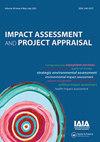奥地利和德国影响评估的未来——简化影响评估以拯救地球?
IF 1.9
4区 社会学
Q3 ENVIRONMENTAL STUDIES
引用次数: 2
摘要
为实现气候减缓目标,对各自的低碳活动进行精简已成为新的趋势。在奥地利和德国,同样在许多其他国家,当局和项目开发人员讨论加速影响评估程序,特别注意到公众参与被怀疑是导致程序延长的因素之一。此外,也受到欧盟关于气候变化和可再生能源的规定的启发,专家们讨论了区域和项目层面之间的精简,以及SEA和EIA之间的精简。在这封信中,作者批判性地审视了与加速风能基础设施规划和调试相关的最新发展,并讨论了机遇、负面后果和局限性。这些都与几个因素有关,例如在适当的规划级别上的评估或数据的质量。该信提供了对内部评估做法的影响和备选建议,这些建议可能支持有效的影响评估,同时保持或提高其质量,特别是考虑到与生物多样性、人类健康和减缓气候变化有关的各种相互冲突的目标。本文章由计算机程序翻译,如有差异,请以英文原文为准。
The future of impact assessment in Austria and Germany – streamlining impact assessment to save the planet?
ABSTRACT Streamlining IA for low-carbon activities respectively to reach climate mitigation targets has become a new trend. In Austria and Germany, likewise in many other countries authorities and project developers discuss acceleration of impact assessment procedures looking particularly at public participation as one of the factors suspected to lead to prolongation of procedures. Additionally, also inspired by the EU provisions regarding climate change and renewable energies, experts discuss streamlining between regional and project level, thus between SEA and EIA. In this letter the authors look critically at the most recent developments related to the ambition to accelerate particularly the planning and commissioning of wind energy infrastructure and discuss both chances but also negative consequences and limitations. These are related to several factors such as the assessment at the appropriate planning level or the quality of data. The letter provides implications for IA practice and alternative suggestions which might support efficient impact assessment while maintaining or improving its quality particularly having in mind the various conflicting targets related to, i.e., biodiversity, human health and climate change mitigation.
求助全文
通过发布文献求助,成功后即可免费获取论文全文。
去求助
来源期刊

Impact Assessment and Project Appraisal
ENVIRONMENTAL STUDIES-
CiteScore
4.60
自引率
22.70%
发文量
52
期刊介绍:
This is the international, peer-reviewed journal of the International Association for Impact Assessment (IAIA). It covers environmental, social, health and other impact assessments, cost-benefit analysis, technology assessment, and other approaches to anticipating and managing impacts. It has readers in universities, government and public agencies, consultancies, NGOs and elsewhere in over 100 countries. It has editorials, main articles, book reviews, and a professional practice section.
 求助内容:
求助内容: 应助结果提醒方式:
应助结果提醒方式:


